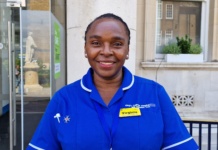
Foreign Secretary Dominic Raab gave the 18 May 2020 daily Downing Street press briefing on the government’s response to the COVID-19 pandemic.Professor Jonathan Van-Tam, Deputy Chief Medical Officer, joined him.
Dominic Raab said:I’ll start with the daily update on the latest data on coronavirus.
- 2,682,716 tests for coronavirus have now been carried out in the UK. That includes 100,678 tests carried out yesterday.
- 246,406 people have tested positive, that’s an increase of 2,684 cases since yesterday.
- 9,408 people are currently in hospital with coronavirus, down 13% from this time last week.
- And I’m very sad to report, of those who have tested positive for covid-19, across all settings, 34,796 have now died. That’s an increase of 160 deaths on yesterday.
It goes without saying that we offer our condolences to the friends and family of every individual who has passed away during this coronavirus pandemic.
It is a challenging time and as we chart the right course over the weeks and months ahead, our overriding priority remains to save lives, whilst also preserving livelihoods and allowing people to return, over time and as and when it’s safe, to something resembling a more normal way of living.
On 11 May, we set out a road map to provide the information, the advice and the reassurance to businesses, public services, to other organisations, to employees and to citizens up and down the country.
And I want to thank everyone who is making the adjustments and engaging with us in government to forge the path ahead in a sure-footed and sustainable way. We recognise people will have concerns and questions, and we want to work together with them, and with everyone involved to provide the necessary confidence and reassurance in the next steps that we are poised to make.
That approach is summarised in the slides, which we have up on the screen.
You’ll see from Slide 1, and as people will be aware, we have established a new COVID Alert System, with five levels, each relating to the current level of threat posed by the virus.
The alert level is focused on the rate of infection, known as the R value, as well as the total number of coronavirus cases overall.
The alert level helps us determine the social distancing measures that we need to fight the virus. So the lower the level, the fewer or the less restrictive the measures we will need at any given time.
Since the lockdown began, at the end of March, we have been at Level 4 as indicated on the slide.
Thanks to the hard work and the huge sacrifices across the UK, and the progress that we’ve made as a result of that, particularly in relation to compliance with the social distancing measures, we are in the process of moving from Level 4 to Level 3 on the slide. We will do that through a number of very careful and deliberate steps.
Last week, the Prime Minister set out the first of three steps, designed to carefully modify the measures that had been put in place.
By gradually easing certain measures, we can begin to allow people to return to something resembling a more normal way of life. The choices we make, what we are asking the British public to do, and what we’re asking them not to do, are designed to avoid the very real risk of a second peak that would overwhelm the NHS and of course risk turning a temporary economic painful moment for the country into permanent damage to the UK economy.
At every step, we’ll closely monitor the impact of easing restrictions, and in particular the impact on the spread of the virus.
It’s only by collecting and monitoring the data will we be able to take the next step, which is indicated as Step 2 on the slides, and that will be no earlier than June 1st.
I understand it’s natural for people to question why they can’t do one or other thing right now, or why certain distinctions have been made, but in reality you have to look at the package of measures as a whole, mindful of the risk to the R level and taking into account the various economic and social effects combined.
We’ve adopted a balanced approach, guided at all times by the science, and the overriding need to avoid a second peak that could overwhelm the NHS.
It’s true to say making any changes inherently comes with some risk of spreading the virus compared to simply staying at home. But it’s also true that staying in permanent lockdown is itself not sustainable on health grounds or economic grounds.
That’s why we have only eased measures where it can be done with the lowest risk possible. And that’s also why we are watching the impact of every change that we make very closely.
I know the last couple of months have been really tough for families, for businesses, for everyone up and down the UK. But it is only by keeping to the plan, sticking to the rules, even including when those rules change, that we will beat coronavirus for good.
That is why we have asked people to Stay Alert, to Control the Virus to Save Lives as we make changes to the measures in place in England and adjust the government’s advice accordingly.
For the vast majority of people, that still means staying at home as much as possible.
For those that can’t work from home, they should return to work with the arrangements in place to ensure it can be safely and responsibly done.
We’ve also adjusted the advice to allow people to exercise more, to visit public outdoor spaces but staying 2 metres apart from those outside their own household.
As ever, people need to keep washing their hands regularly and carrying out the hygiene measures that we’ve advertised before.
Our advice is to wear a face covering when you are outside the home in enclosed spaces and where it’s difficult to socially distance – for example if going to the shops or travelling on public transport. And if you or anyone in your household develops symptoms, then you still all need to self-isolate.
Now while we’re asking the public to do these things, we in government will keep ramping up the effort that we need to see to get the UK back to a more normal way of living.
With that in mind, today, the Health Secretary announced that anyone in the UK with covid-19 symptoms can now get a test by booking online and I can also report that we’ve now recruited over 21,000 contact tracers and call handlers in England for the implementation of our test and trace programme.
That programme is absolutely key in the next steps we need to take as a country to come through this pandemic safely and responsibly.
Kindly follow us on twitter:@AfricanVoice2









